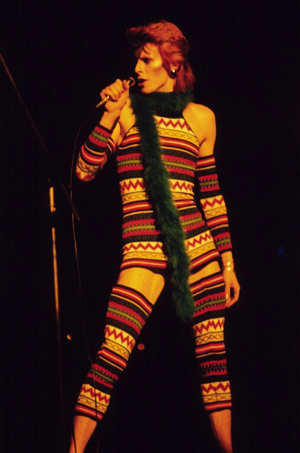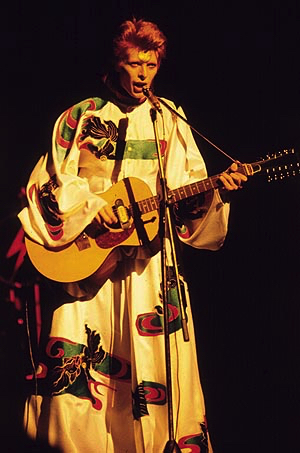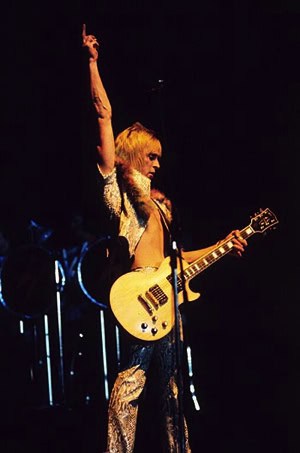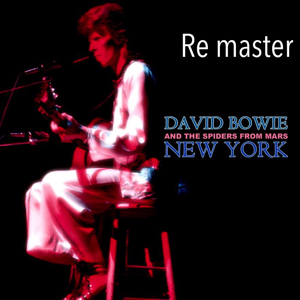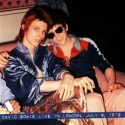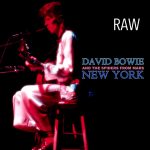David Bowie 1973-02-14 New York, Radio City Music Hall (re-master)
Sound Quality Rating
01. Intro
02. Hang On To Yourself
03. Ziggy Stardust
04. Changes
05. Soul Love
06. John,Im Only Dancing
07. Moonage Daydream
08. Five Years
09. Space Oddity
10. My Death
11. Watch That Man
12. Drive In Saturday
13. Alladin Sane
14. Panic In Detroit
15. Cracked Actor
16. The Width Of A Circle
17. Introduction / Time
18. The Prettiest Star
19. Lets Spend The Night Together
20. Jean Genie
21. Suffragette City
22. Rockn Roll Suicide
Label: No label
Audio Source: audience, not vinyl or CD sourced !!!)
Lineage: Tape
Total running time: 1:34:21
Sound Quality : Not good ,much Noise ,very dull
Attendance: 5.884
Artwork: Bewley Brother design 2011.
Remaster :Yes
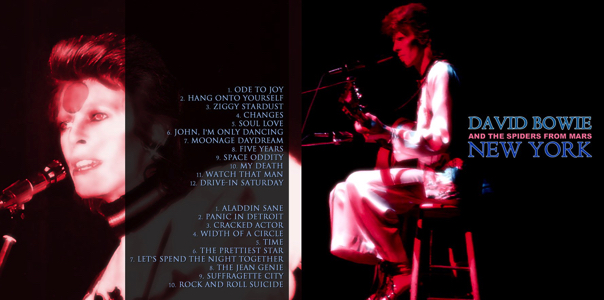
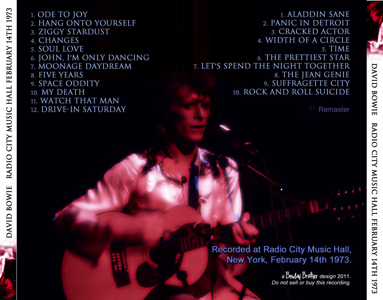
This is Bowie’s big breakthrough in the US.
The show was becoming even more outrageous with many new costume changes and more bizarre make-up. Both shows are a sell-out of 6,200 people each. Attending celebrities include Truman Capote, Salvador Dali (a fan who has attended other Bowie performances), Johnny Winter and Todd Rundgren. Bowie faints on stage after a fan leaps on the stage during “Rock n Roll Suicide” and embraces him. He is diagnosed by an attending nurse as suffering from exhaustion (blocked pores from the makeup is also blamed) and sleeps 12 hours straight the next day. Rumours suggest that gunshots rang out before Bowie collapsed but audience tapes do not support this fanciful theory.
“The giant auditorium was filled with Walter Carlos’ recorded cybernetic music from Clockwork Orange, as several layers of curtains parted to reveal a giant screen on which was projected an animated film of the cosmos rushing at light speed at the viewer. A single spotlight opened up on a set of large concentric spheres welded into a cage and suspended 50 feet above the floor of the stage, in the middle of which was standing a stern and staring Bowie clad in a black silver silk garment, the first of what would be five different costumes that night. It was truly an amazing sight: Bowie the noted acrophobe, who won’t fly in planes or ascend above a certain level in buildings, coolly gazing at his adoring fans, while his band, The Spiders From Mars, augmented by six additional musicians on horns and percussion, cranked into “Hang Onto Yourself”…. At times Bowie acted out his role as a straight pop singer, a sort of hyperthyroid Anthony Newley; at others he would change into a progressively more skimpy costume and whip his arse around, a campy gamine leg-throw here, a cute barefoot pirouette there. Those songs dealing with Bowie’s starkly paranoid themes of rock-star death, impending planetary doom and coming suicide were treated as little theater pieces, playlets recited and acted rather than sung and played.” – Stephen Davis – Rolling Stone Magazine.
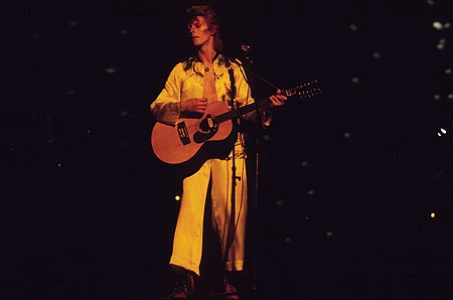
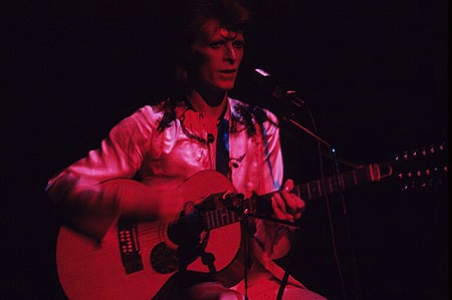
The Concert Tapes:
This is the famous concert in which Bowiee descended on the stage in a cage hanging 17 meters above the stage. A spectacular opening of this concert which was given on Valentine’s Day and was also the first concert of the short US Tour II. It was a full house. The group Fumble was to do the first part of the programme,but for some reason it was cancelled.
“They can’t see,sit down!” some one cries out after Hang on to Yourself. After Ziggy Stardust Bowie says: “It’s nice to come down to New York again”.
Although the band was reinforced with additional saxophone players,Bowie did the sax solo in Soul Love himself. This tape and that of the second evening in NY are the only 1973 tapes which include this number.
After My Death a screen was raised at the back of the stage displaying a cartoon in which the cosmos seems to bear down upon the spectators at the speed of light.
This is a very long concert by the way: no fewer than 21 numbers,including all numbers but one of the entire LP Aladdin Sane which at the time had not yet appeared. After Watch That Man Bowie says: “In case you’d like to know,we’ve made a new album,that was the first,it’s called Watch That Man. As you might know,we brought some new people with us tonight,a very quick one is Ken Fordham who’s very quick but a little bit tired,Geoffrey and Hutch and you may know Mike Garson from my last tour. This is a track from the new album anyway,this one is called Drive in Saturday which was written between Phoenix and Seattle”.
The audience respond well to the new numbers but when Cracked Actor is over no one applauds,probably because the audience are not sure whether it is really over or may yet go on. “That was called Cracked Actor“ Bowie says,and then the audience starts applauding.
Bowie announces Width of a Circle and the long guitar solo in the number he used to change costume again,which that night he did as many as seven times! After the number Bowie introduces the band,but not the additional musicians whom he had al ready introduced to the audience.
From Jean Genie onward the tape is considerably inferior(SQ 6!). During Rock & Roll Suicide something happened of which a good description can be found in Stephen Davis’ review of this concert in the Rolling Stone of 29-3-1973:
“During Suffragette City Bowie’s maraca broke and a piece of it lodged in his eye,which he was rubbing as the band left the stage. The crowd demanded more and was kept waiting five ~as restored. He came back on in six-inch stacked heels for a beltin& torchy Rock & Roll Suicide. Bowie played the edge of the stage,inciting the droolers to lurch at him. One man actually ~ade it and,grabbing Bowie in a hug,planted a big wet kiss on his desiccated cheeks.
The man was hurled back into the mealstrom in front of the stage and Bowie re sponded to the assault by crumpling like a pansy in a monsoon,a fainting heroine in an old French play – Ca mille – “Ah,mon amour, j’etouffe!”. With the star recumbent and unconscious on the floor, the house lights went off and he was carried off. When the house lights came on,the stage was empty. Rock & roll suicide and the kiss of death”.
The immense tension to which he had been exposed during the preparations of the tour had made too high demands upon his system which was the reason of his fainting. He immediately went to sleep and slept for no less than twelve hours!
Obviously a rather excep tional tape,but it’s a pity that Bowie’s voice sounds rather far off. Of the pistol cracks which are supposed to be heard on this tape there is not a trace. One does hear all sorts of grumbling sounds and the audience cry “No,I can’t believe this,no!”.
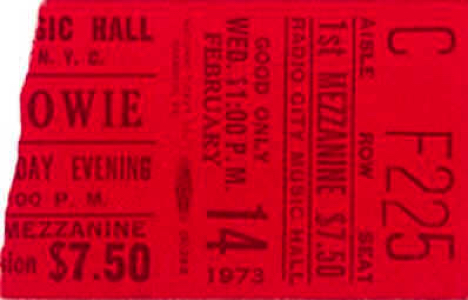
Review Binky Philips :
Binky Philips who went to NY’s Radio City Music Hall show on February 14 1973. He recalls: “My dear pal, David, about the Bowie show I’d seen the night before at Radio City Music Hall. It was only Bowie’s second time in New York and it was everything that the Carnegie Hall show hadn’t been. An extravaganza!
Bowie, in a mere four months, had become a STAR! The show was sold out! The buzz was deafening!
Playing Radio City, Bowie was clearly prepared and determined to take advantage of every stage gimmick the venerable venue had at its disposal. Hydraulic stage risers, smoke machines, scrims, absolutely incredible lights, an augmented band of at least 7, foxy female techs, 5 or 6 costume changes… And what costumes, fashion-forward into the next century! Something “Oooo, ahhhh!” cool was happening during almost every song. And Bowie himself was much further out… bigger redder hair, blatantly obvious make up, almost anorexic-thin, and utterly androgynous (we all loved the fact that, in an age when virtually any gay celebrity was still in the closet, David Bowie was a straight guy pretending to be gay).
The show ended with Bowie suddenly and shockingly collapsing toward the end of the encore, [Rock ‘n’ Roll Suicide] just as he got to the line “Give me your hands…”. A bodyguard, dressed all in black rushed out of the wings and picked Bowie up like a limp broken doll and carrying him off stage with the lights going black… What the… Did he faint? Had he been shot?! The audience’s reaction was in disarray. A minute later, I realized I’d just witnessed one of the great Rock’n’Roll exits of all time.”
David Bowie Tour Band – The Ziggy Stardust Tour
David Bowie – vocals, guitar, harmonica
Mick Ronson – guitar, vocals
Trevor Bolder – bass
Mick “Woody” Woodmansey – drums
Matthew Fisher – piano (20 Apr 1972 – 27 May 1972)
Robin Lumley – piano (2 Jun 1972 – 15 Jul 1972)
Nicky Graham – piano (1 Aug 1972 – 7 Sep 1972)
Mike Garson – piano, mellotron, organ (22 September 1972 – end of tour)
John Hutchinson – rhythm guitar, 12-string acoustic guitar (8 Apr 1973 – 20 Apr 1973 – 3 July 1973)
Aynsley Dunbar – additional drums (8 Apr 1973 – 20 Apr 1973)
Geoffrey A. MacCormack – backing vocals, percussion (19 January 1973 – end of tour)
Ken Fordham – saxophone (19 January 1973 – end of tour)
Brian Wilshaw – saxophone, flute (19 January 1973 – end of tour)
Crew
Robin Mayhew ,Will Palin ,Mick Hince ,Dean Heiser – Sound ,Ground Control ,Front of House Engineer ,Stage hands
Nigel Olliff, Nick Gilbey, Paul Normand and crew – Lights ,1972 Heavy Light ,1973 See Factor Industries NY Bob See ,Steve Hurston ,Mick Fussey
Peter Hunsley – Stage Equipment
Suzi Fussey – Wardrobe, Makeup and Hair
.
